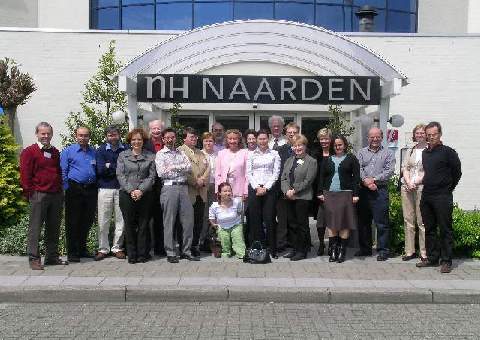Nemaline Myopathy
- Number 138
- Date 20 May 2005
Twenty doctors and scientists from 9 countries gathered in Naarden, The Netherlands, from 20th-22nd May 2005 for the sixth ENMC workshop on nemaline myopathy.
The sixth workshop was marked by discussion of disease processes, analysis of nemaline bodies in cell culture and animal models of nemaline myopathy based on genes previously identified as causing the disorder. One of the animal models has been investigated for the effects of exercise on muscle function after immobilisation, with the results supporting the beneficial effect of exercise after immobilisation. Further analysis of the genes identified for nemaline myopathy is ongoing. Mutations of actin account consistently for 20-25% of nemaline myopathy. The commonest cause of nemaline myopathy remains mutations in the giant nebulin gene for which mutation detection continues to be a technical challenge. Identifying further nemaline myopathy genes is a constant goal of the Consortium.
The Consortium had been asked to address the issue of steroid use in nemaline myopathy. After discussion the Consortium agreed that there was insufficient information to support a recommendation and has concerns as to potential adverse effects especially in the treatment of very young children. Members of the Consortium are to further investigate the issue. Any potential benefit of L-tyrosine has also not yet been adequately validated. To properly address the efficacy of any treatment there needs to be multi-centre, well co-ordinated clinical trials.
The multinational and multidisciplinary approach necessary for tackling rare muscle disorders remains the focus of the Consortium. The Consortium recognises that the aim for the next, perhaps considerable number of years, is to work towards effective treatments for the various nemaline myopathies, possibly based on approaches being investigated for the more common muscular dystrophies. An important part of management of nemaline myopathy patients is monitoring of respiratory function and implementation of respiratory support where necessary, the recommendations for which were published in the report of the 117th ENMC workshop: ventilatory support in congenital neuromuscular disorders.
An extended report of this meeting is published in Neuromuscular Disorders. (pdf)
This workshop was organised by Dr. C. Wallgren-Petterson (Helsinki, Finland) and Dr. N. Laing (Nedlands, Western Australia)

ENMC
Lt. generaal van Heutszlaan 6
3743 JN BAARN
The Netherlands
+ 31- 35-5480481
enmc@enmc.org
We may request cookies to be set on your device. We use cookies to let us know when you visit our websites, how you interact with us, to enrich your user experience, and to customize your relationship with our website.
Click on the different category headings to find out more. You can also change some of your preferences. Note that blocking some types of cookies may impact your experience on our websites and the services we are able to offer.
These cookies are strictly necessary to provide you with services available through our website and to use some of its features.
Because these cookies are strictly necessary to deliver the website, refusing them will have impact how our site functions. You always can block or delete cookies by changing your browser settings and force blocking all cookies on this website. But this will always prompt you to accept/refuse cookies when revisiting our site.
We fully respect if you want to refuse cookies but to avoid asking you again and again kindly allow us to store a cookie for that. You are free to opt out any time or opt in for other cookies to get a better experience. If you refuse cookies we will remove all set cookies in our domain.
We provide you with a list of stored cookies on your computer in our domain so you can check what we stored. Due to security reasons we are not able to show or modify cookies from other domains. You can check these in your browser security settings.
These cookies collect information that is used either in aggregate form to help us understand how our website is being used or how effective our marketing campaigns are, or to help us customize our website and application for you in order to enhance your experience.
If you do not want that we track your visit to our site you can disable tracking in your browser here:
We also use different external services like Google Webfonts, Google Maps, and external Video providers. Since these providers may collect personal data like your IP address we allow you to block them here. Please be aware that this might heavily reduce the functionality and appearance of our site. Changes will take effect once you reload the page.
Google Webfont Settings:
Google Map Settings:
Google reCaptcha Settings:
Vimeo and Youtube video embeds:
The following cookies are also needed - You can choose if you want to allow them:
You can read about our cookies and privacy settings in detail on our Privacy Policy Page.
Privacy Policy